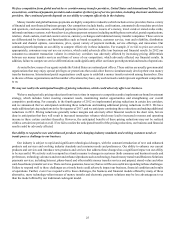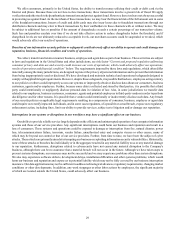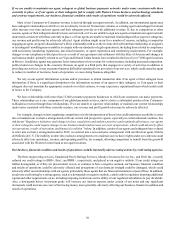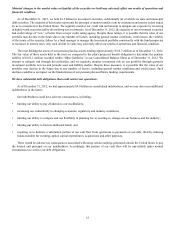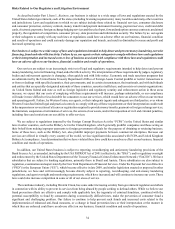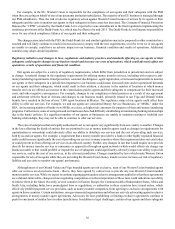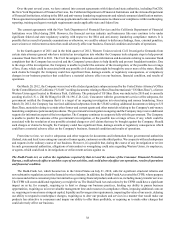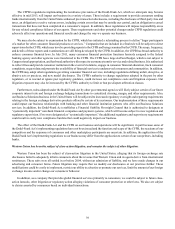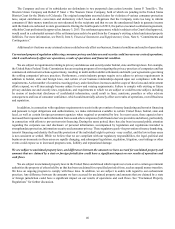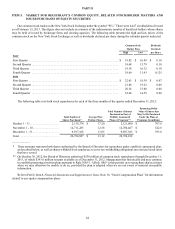Western Union 2012 Annual Report Download - page 40
Download and view the complete annual report
Please find page 40 of the 2012 Western Union annual report below. You can navigate through the pages in the report by either clicking on the pages listed below, or by using the keyword search tool below to find specific information within the annual report.35
Our fees, profit margins and/or foreign exchange spreads may be reduced or limited because of regulatory initiatives and
changes in laws and regulations or their interpretation and industry practices and standards that are either industry wide or
specifically targeted at our Company.
The evolving regulatory environment, including increased fees or taxes, regulatory initiatives, and changes in laws and
regulations or their interpretation, industry practices and standards imposed by state, federal or foreign governments and
expectations regarding our compliance efforts, is impacting the manner in which we operate our business and may change the
competitive landscape and adversely affect our financial results. New and proposed legislation relating to financial services
providers and consumer protection in various jurisdictions around the world has and may continue to affect the manner in which
we provide our services, see risk factor “The Dodd-Frank Act, as well as the regulations required by that Act and the actions of
the Consumer Financial Protection Bureau, could adversely affect us and the scope of our activities, and could adversely affect
our operations, results of operations and financial condition.” Recently proposed and enacted legislation related to financial
services providers and consumer protection in various jurisdictions around the world and at the federal and state level in the United
States may subject us to additional regulatory oversight, mandate additional consumer disclosures and remedies, including refunds
to consumers, or otherwise impact the manner in which we provide our services. If governments implement new laws or regulations
that limit our right to set fees and/or foreign exchange spreads, then our business, financial condition and results of operations
could be adversely affected. In addition, changes in regulatory expectations, interpretations or practices could increase the risk of
regulatory enforcement actions, fines and penalties.
For example, our business has been affected and is currently being affected by on-going changes to our compliance procedures
related to our agreement and settlement with the State of Arizona. See risk factor “Western Union is the subject of governmental
investigations and consent agreements with or enforcement actions by regulators.” Due to regulatory initiatives, we have changed
our compliance related practices and business model along the United States and Mexico border, including in the southwestern
region of the United States. Such changes have had, and will likely continue to have an adverse effect on our revenue, profit
margins, and business operations related to our United States to Mexico and United States to Latin America and the Caribbean
corridors.
In addition, one state has passed a law imposing a fee on certain money transfer transactions, and certain other states have
proposed similar legislation. At least two foreign countries have enacted rules imposing taxes or fees on certain money transfer
transactions, as well. Although money transfer services themselves are not generally subject to sales tax on money transfer services
elsewhere in the United States, the current budget shortfalls in many jurisdictions, combined with continued federal inaction on
comprehensive immigration reform, may lead other states or localities to impose similar taxes or fees. Similar circumstances in
foreign countries could invoke similar consequences. A tax or fee exclusively on money transfer services like Western Union could
put us at a competitive disadvantage to other means of remittance which are not subject to the same taxes or fees.
Other examples of changes to our financial environment include the possibility of regulatory initiatives that focus on lowering
international remittance costs. For example, Pakistan subsidizes certain remittances into the country from Pakistanis working
abroad. We do not participate in this program, but remittance companies accepting the subsidy are prohibited from charging fees
to the sender or receiver. Such initiatives may have an adverse impact on our business, financial condition and results of operations.
Regulators around the world increasingly look at each other's approaches to the regulation of the payments and other industries.
Consequently, a development in any one country, state or region may influence regulatory approaches in other countries, states or
regions. This includes the interpretation of the Dodd-Frank Wall Street Reform and Consumer Protection Act (the “Dodd-Frank
Act”). Similarly, new laws and regulations in a country, state or region involving one service may cause lawmakers there to extend
the regulations to another service. As a result, the risks created by any one new law or regulation are magnified by the potential
they have to be replicated, affecting our business in another place or involving another service. Conversely, if widely varying
regulations come into existence worldwide, we may have difficulty adjusting our services, fees and other important aspects of our
business, with the same effect. Either of these eventualities could materially and adversely affect our business, financial condition
and results of operations.
Our agents' or their subagents' failure to comply with federal and state laws and regulations as well as laws and regulations
outside the United States could have an adverse effect on our business, financial condition and results of operations.
Any determination that our agents or their subagents have violated laws and regulations could seriously damage our reputation
and brands, resulting in diminished revenue and profit and increased operating costs. In some cases, we could be liable for the
failure of our agents or their subagents to comply with laws which also could have an adverse effect on our business, financial
condition and results of operations.


